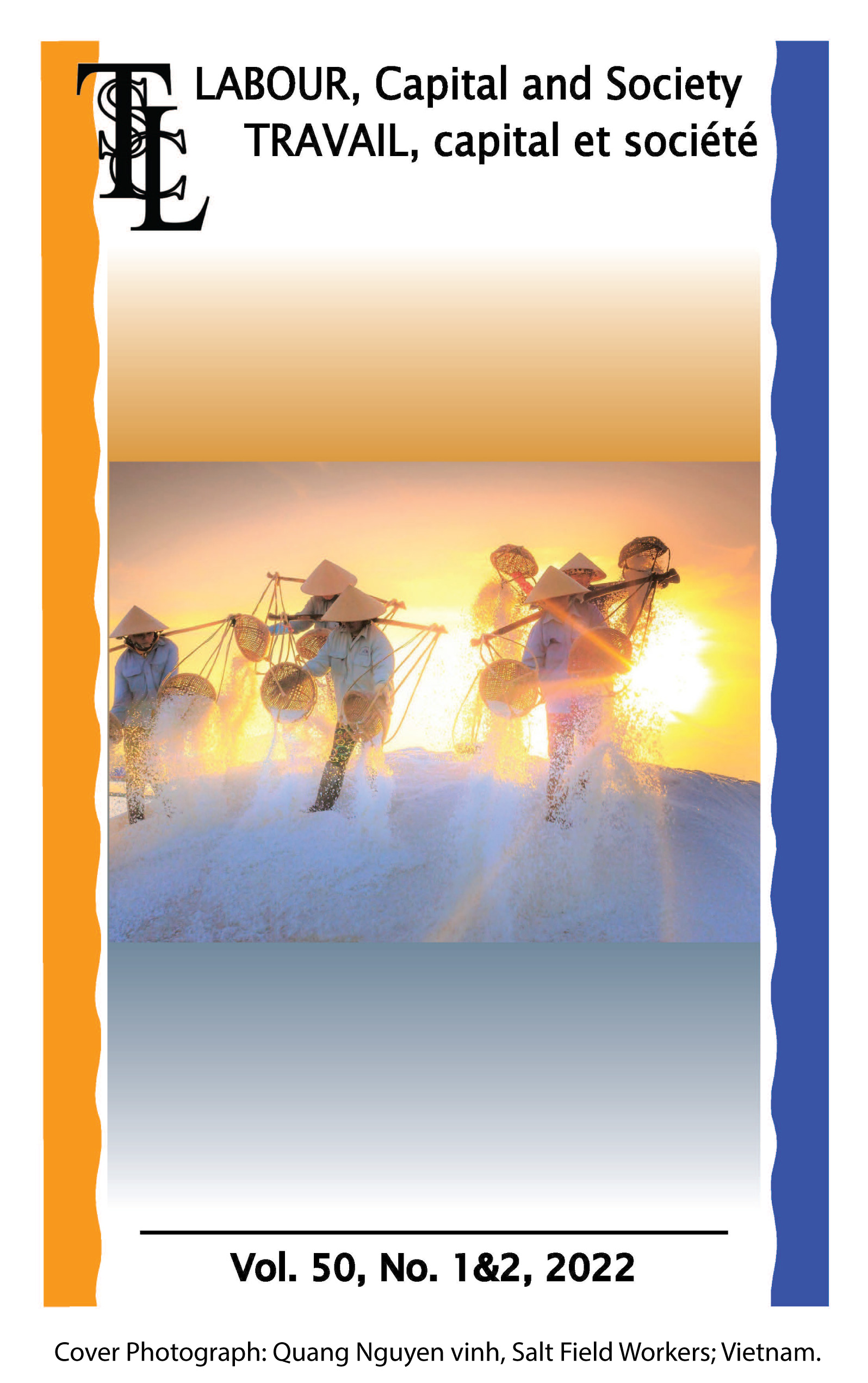
EDITOR’S INTRODUCTION Suzanne Dansereau Welcome to Volume 50 of the journal, an impressive marker that reflects the work of many authors, contributors, editors and advisors over many years. This issue benefitted from the assistance of 2 co-editors, members of the journal’s Editorial Committee – Professor Dolores Chew and Dr. Mélanie Dufour-Poirier. This issue addresses a major theme in the changing world of work which increasingly combines wage work with non-wage earnings, bringing together proletarian wage work with non-wage forms of livelihood. This is often referred to as the distinction between productive labour and reproductive labour, usually instituted in order to make labour increasingly precarious and poorly paid. The result is blurred lines between proletarian and non-proletarian relationships and has prompted new forms of popular resistance and created new challenges for trade unions and the labour movement as a whole. These forms include, among others, the circular migration of workers between the wage economy and small-scale and subsistence farming within national borders; the growing international movement of temporary migrant workers as well as those who seek permanent migration; and the growing informalization of labour as well as domestic labour. The articles draw attention to the way in which these complex relationships have been under additional pressure and often changed as a result of the COVID pandemic. Hastie’s article explores the struggle of international temporary farm workers on Canadian farms as they attempted to improve their situation during the height of the COVID pandemic. Researching this struggle brings into sharp relief many enduring labour issues across a range of jurisdictions. The intersection between their status as both migrants and workers has left them with a corrosive disadvantage, one that impacts both formal entitlements and practical access to necessary rights, goods and resources, including in the areas of health care, housing, and working conditions, and their ability to seek legal recourse or to remedy the violations of their rights. Bayane explores the changing dynamic between employer and employee in family domestic work resulting from changes in the relationship between family and work during COVID as many domestic employers were required to work from home. Domestic work is one of the largest sources of employment in South Africa, a great deal of which is undertaken within extended families. His article explores the blurred lines between family relationships and employer-employee relationships, a poorly researched area. Singh analyses small-scale farmer resistance in India and their year-long strike against government attempts to reform the small-scale farming sector by introducing neo-liberal laws aimed at opening the agricultural sector to increased market forces. Many of these farmers engage in both farming and wage employment, in a form of domestic circular migration between the urban cash economy and rural agricultural areas. This widespread resistance occurred within the backdrop of the COVID pandemic in which millions of migrant workers were sent home. She analyses the lengthy struggle within its political context and emphasizes the emergence of new alliances between workers in different sectors and featured an important role for women. Henaway takes up the issue of migrant labour again, looking at both international temporary foreign workers and permanent migrants in Canada. He explores the challenges facing migrant workers who were deemed ‘essential’ during COVID and the organising strategies of the International Workers Centre in Montreal, Quebec. He reveals the centrality of race and class to making these inequities possible, arguing that they are central to capitalism. We are fortunate in this edition to have two extensive research notes. The first by Mélanie Dufour-Poirier and Francine D’Ortun and their research on training social delegates of Quebec’s Federation of Labour (FTQ). The second is by Onohoe’ Omhen Ebhohimhen on Nigerian trade unions in the face of globalisation and labour casualization. We are pleased to return to book reviews with 4 reviews on a range of important topics. A final note, the journal is undergoing significant changes both among its contributord and in its location. This is my last issue as Editor. After several years of involvement with the journal, I became editor in 2005, inheriting it from its very capable and inspiring founding editor Rosalind Boyd. It has been my pleasure to work with the members of both the Editorial Committee and the Consultative Board as well as the many interesting authors from whom I’ve learned so much. I also extend my deep thanks to the many editorial assistants who have contributed to the journal. All were graduate students from the International Development Studies Department, (now renamed Global Development Studies) at Saint Mary’s University. Final thanks are also extended to that Department as well to Saint Mary’s Graduate Faculty and the accounts department who put up with this strange project in their midst. A very special thanks to Dan Wile, Mehjabeen Alarakhia, Hélène Dansereau, Jenny Harrison and Simone Mutabadzi. On behalf of the entire journal community as well as myself, I am sorry to announce that we are mourning the loss of Dr. Myron Echenberg, History professor at McGill University, author, long-time valued contributor to our Editorial Committee and a great teacher. He will be deeply missed. The direction of the journal will be undertaken by the Editorial Committee with the help of Professor Dolores Chew and Mélanie Dufour-Poirier. The journal will be relocated back to Montreal, Québec. Please note the new address: Prof Dolores Chew | |
|
| |
| Editor’s Introduction / Introduction
de la rédactrice The Corrosive Disadvantage of Status: A Case Study on COVID-19 and Migrant Agricultural Workers in Canada Navigating Family–Work Relationships during Covid-19 Pandemic: Family Domestic Workers in Rural Limpopo, South Africa They Were Making Their Own History: The Indian Farmers Protest 2020-21 Book Reviews Notes Dochuk, Darren Ferreras, Isabelle, Batillana, Julie et Dominique Méda Chase-Dunn, Christopher and Paul Almeida Parreñas, Rhacel, Salazar Research Notes Trade Unions and Globalisation: Impact of neoliberalism on Nigerian workers Full Issue Download Editorial Information for this issue |
|